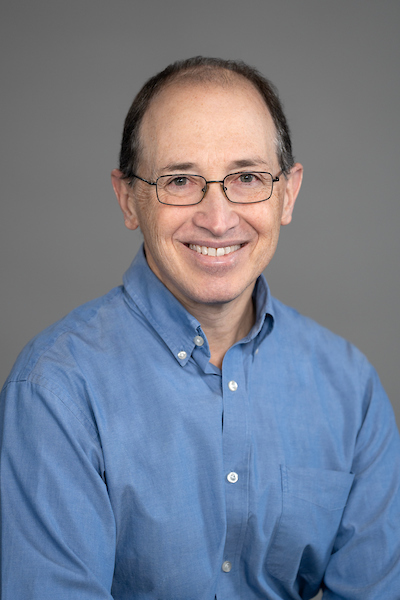
>> Executive Connections Stories
Becoming the best version of yourself: An interview with mentor David Greenberg

David Greenberg
As a mentor to Full-time MBA students at Arizona State University, experienced marketing executive David Greenberg believes there is no “one size fits all” approach to being a leader. The Executive Connections program at the W. P. Carey School of Business follows this same philosophy.
"One of the things I like most about it now is the first day, the students are trying to decide who they would like to have as a mentor," he says. "I love the process of coming in, meeting with students and discussing, 'Here's how I think about this. If you're going to work with me and let me try and help you be who you're going to become, here's how I like to approach it. If that speaks to you, that's great. I'm your person.'"
The W. P. Carey School asked Greenberg about how he has benefited from being a mentor, what favorite piece of advice he has for mentees, and why the Executive Connections mentorship program makes the W. P. Carey Full-time MBA stand out.
Q&A with David Greenberg
What is it that makes Executive Connections so unique and impactful? Mentors, alumni, and current students know best. This conversation with David Greenberg has been edited and condensed.
Question: What keeps you coming back as an Executive Connections mentor, and what do you gain from being a mentor?
Answer: I think what I get from it, more than anything else, is the feeling that I'm doing something good to give back. Hopefully I can help bring students along and create a path for their careers.
That process is different with every single student, and to me, that's part of the joy. It's not knowing exactly what each student is going to need over the two years that they're here and how I can help them figure it out. There's always a little bit of a puzzle there, and you never know exactly what those puzzle pieces are going to look like until you meet your mentees and start spending time with them.
It’s an honor to be part of this incredibly accomplished group of mentors who have been executives in the business world or the nonprofit world. They come here without egos and with a strong desire to serve, to share their experience, and to help ASU Full-time MBA students become their best selves. It's a great calling.
Q: What do you think makes Executive Connections so unique and impactful for W. P. Carey students?
A: I think it's helpful that there are a lot of different mentors who come at things from different points of view. When I started here back in 2014, this program was a little bit different. Like a lot of things, it's evolved, and the needs have evolved. We figured out what works the best, and there have been changes both in the program and at the school as well.
One of the things I like most about it now is the first day, when students decide who they would like to have as a mentor. It used to be that we were just matched up, so I would largely just get marketing students. Now it's more of who we pair up with the best.
I love the process of coming in, meeting with students and discussing, “Here's how I think about this. If you're going to work with me and let me try and help you be who you're going to become, here's how I like to approach it. If that speaks to you, that's great. I'm your person.” Some students might say, “I don't want any part of that,” and that’s OK, because there's going to be another mentor who's right for them. I like that there's a diversity of experience in terms of the mentors with different approaches.
At the end of the day, what matters most is that the students are able to get what they're looking for and what they think is going to best help them out in the business world, whatever that journey might look like for them. We want students to graduate feeling like they received terrific insight, direction, and help from the person they chose as a mentor.
Q: What would you say is the best piece of leadership advice you’ve given one of your mentees?
A: I think the overall best advice, and I give this advice to everybody, is to be yourself. Be the best version of yourself, and find places and people that value who you are for what you are. That doesn't mean we can't change, or that we shouldn't try and get better.
We all have opportunities to be better people, and to be better professionals and better leaders and managers. But at the same time, we are who we are. I think it's all about trying to find the right places, so you don't feel like, “I can't do my best work here,” or “I can't do my best work with this person or these people.”
I’ve probably given that advice, word for word, in just about every meeting with every mentee I've ever had.
Q: What advice would you give a future Full-time MBA student about getting the most out of the Executive Connections program?
A: I think one of the things students can do to leverage the program is to lean into it and spend more time with their mentor. Also, don’t necessarily think that your mentor is just somebody who was working in the 1990s, the 2000s, and the 2010s. They have insights that are still true.
There are universal truths about how you treat people, how you manage your way through an organization, how you manage your career, and how you become the best version of yourself. Look for that insight and think about how it can be applied to your situation.
I also suggest having the willingness and the ability to spend more time and reach out. Be proactive, rather than reactive, with the mentors in terms of getting feedback and insight, and getting recommendations for what you’re doing and what you could be doing differently. This builds trust, helps you and your mentor get to know each other, and leads to growth. The students who get the most out of the program are the ones who invest the most time and energy.
I tell folks they’re not going to have access to dedicated mentorship like this for most of the rest of their career. If you're fortunate, you'll find a good mentor, or two or three, who help you along the way. But most companies aren't structured in such a way where they have somebody who's there to mentor you.
Take advantage of Executive Connections while you can, because these mentors are here to help you, and that is their only job. When you have that kind of resource, make the most of it.